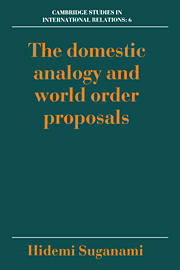Book contents
- Frontmatter
- Contents
- Acknowledgements
- Introduction
- 1 The domestic analogy debate: a preliminary outline
- 2 The range and types of the domestic analogy
- 3 Some nineteenth-century examples
- 4 Contending doctrines of the Hague Peace Conferences period
- 5 The impact of the Great War
- 6 The effect of the failure of the League on attitudes towards the domestic analogy
- 7 The domestic analogy in the establishment of the United Nations
- 8 The domestic analogy in contemporary international thought
- 9 The domestic analogy and world order proposals: typology and appraisal
- Conclusion
- Notes
- References
- Index of personal names
- Subject index
Conclusion
Published online by Cambridge University Press: 18 December 2009
- Frontmatter
- Contents
- Acknowledgements
- Introduction
- 1 The domestic analogy debate: a preliminary outline
- 2 The range and types of the domestic analogy
- 3 Some nineteenth-century examples
- 4 Contending doctrines of the Hague Peace Conferences period
- 5 The impact of the Great War
- 6 The effect of the failure of the League on attitudes towards the domestic analogy
- 7 The domestic analogy in the establishment of the United Nations
- 8 The domestic analogy in contemporary international thought
- 9 The domestic analogy and world order proposals: typology and appraisal
- Conclusion
- Notes
- References
- Index of personal names
- Subject index
Summary
In chapter 1 we outlined the debate about the domestic analogy in the history of ideas about world order by indicating who appear to be among its critics, and who among its supporters. In chapter 2, however, we noted that the domestic analogy in fact encompasses a wide variety of ideas, and that there are some cases which require careful consideration in order to establish whether or not the analogy can be said to be involved in the argument concerned. The implication was that the debate about the analogy might not be understood accurately if we considered it simply as one between its ‘supporters’ and ‘critics’. The type of domestic analogy employed, and the extent to which it is accepted need to be analysed.
Bearing this in mind, we examined in chapters 3–8 proposals for world order in six historical periods, mainly with respect to Anglo-American sources. These chapters revealed a variety of attitudes towards the domestic analogy. In chapter 9, we suggested five basic positions around which ideas about world order are clustered, each embodying a distinctive attitude towards the analogy. The domestic analogy debate has been shown not to be a bilateral, but a multilateral one.
One important feature of the debate about the domestic analogy is the extent to which writers' attitudes towards the analogy are influenced by the events and circumstances in the domestic and international spheres against the background of which their ideas about world order are formulated.
- Type
- Chapter
- Information
- The Domestic Analogy and World Order Proposals , pp. 197 - 208Publisher: Cambridge University PressPrint publication year: 1989



